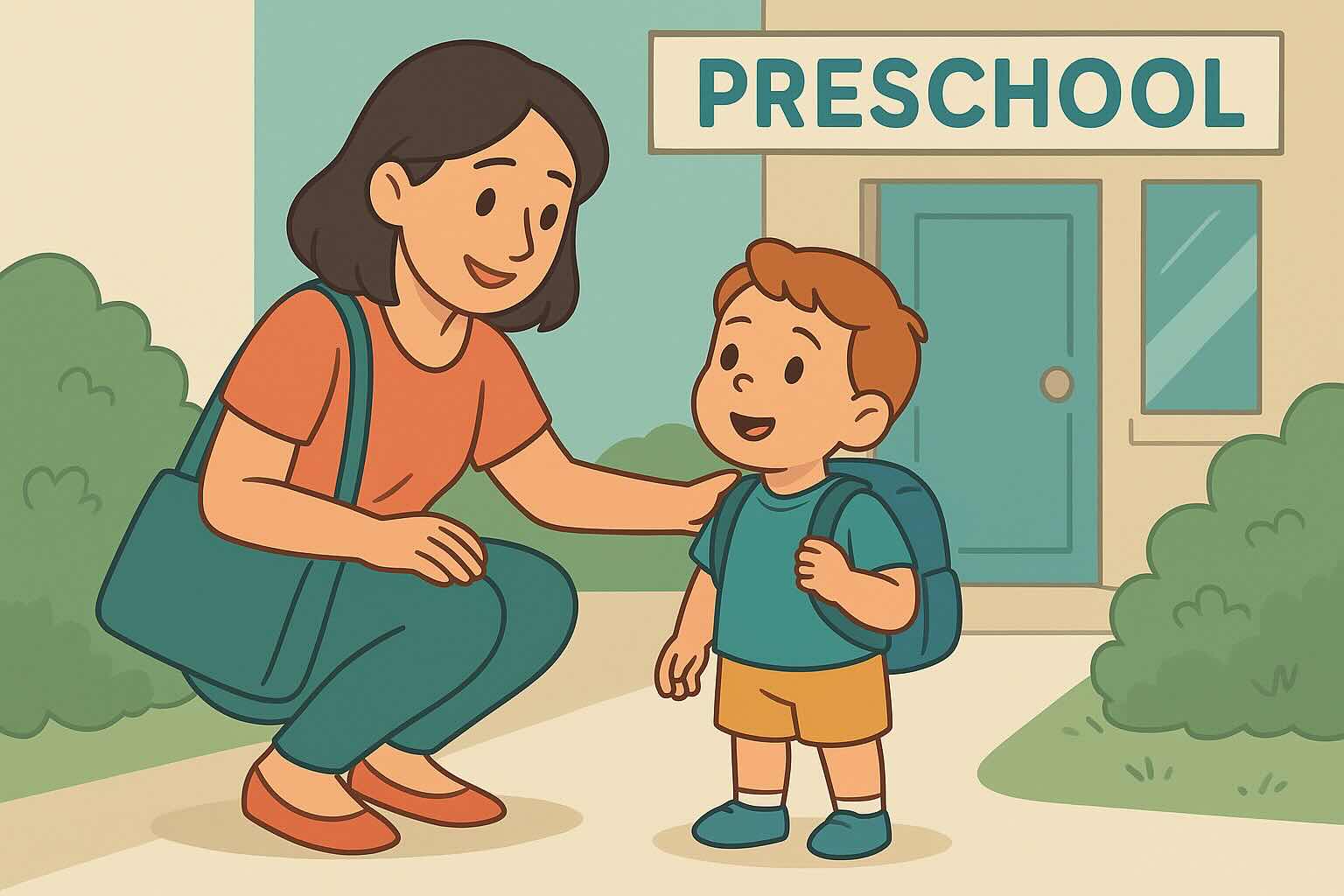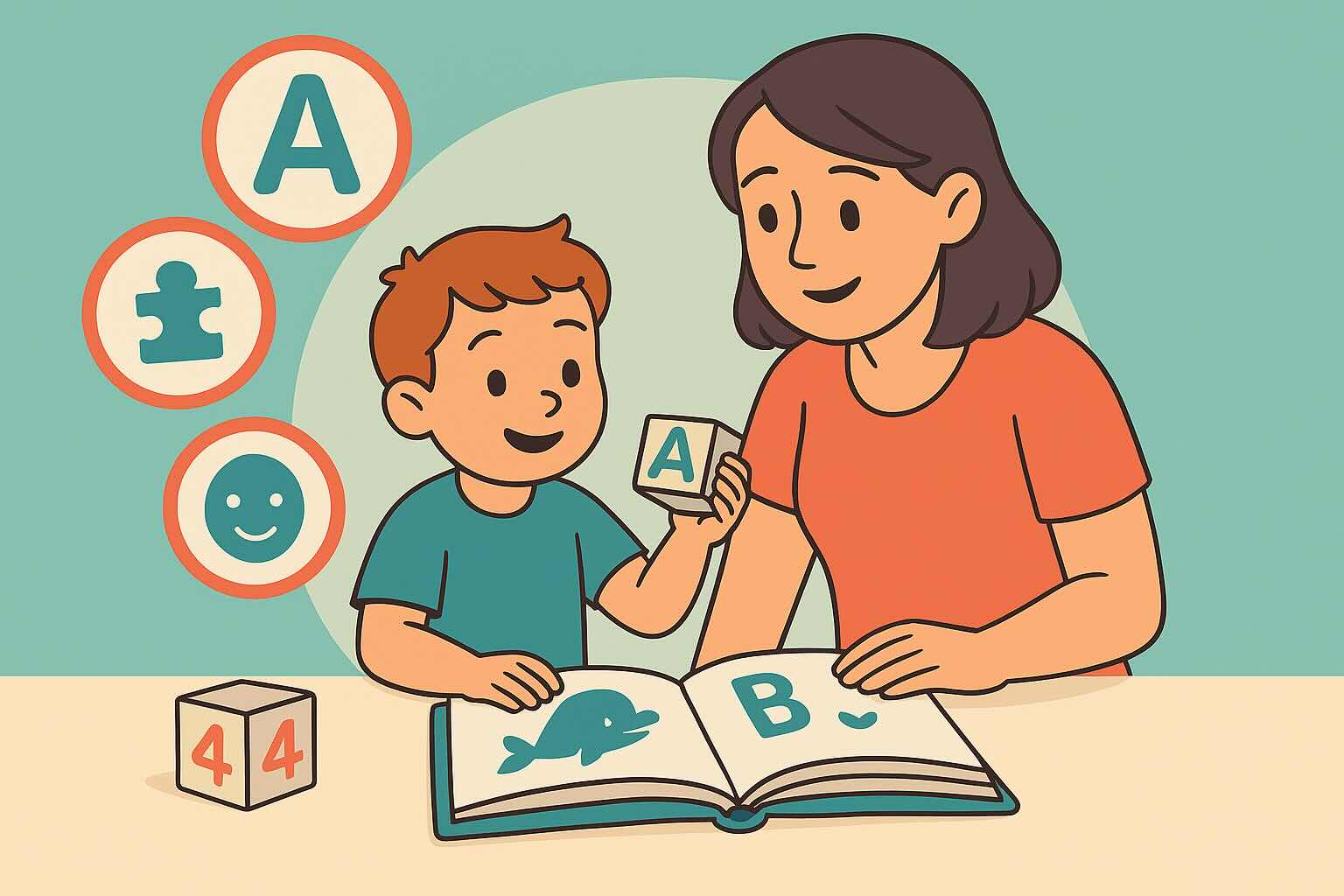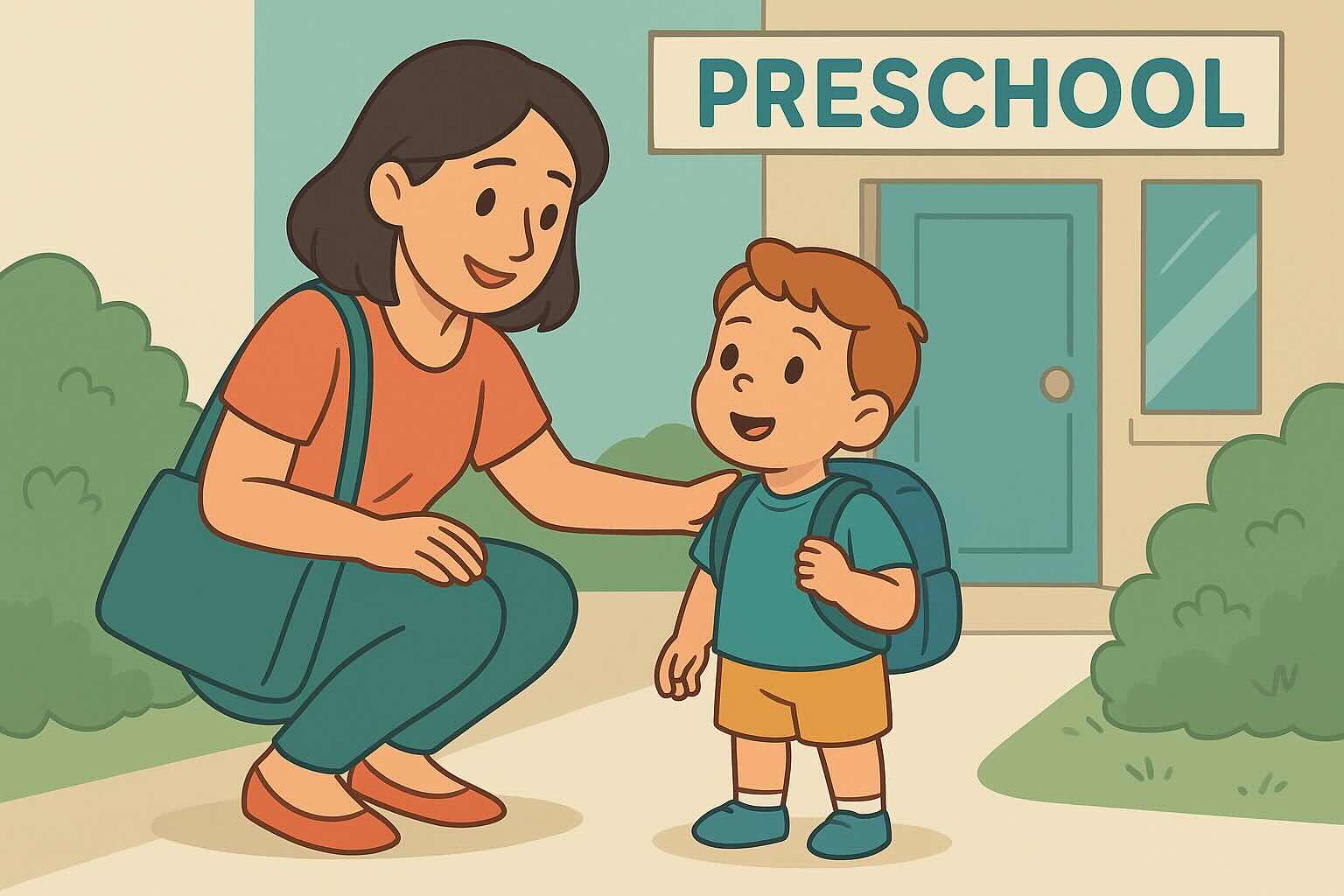Starting Kindergarten at 5: 12 Confidence-Building Strategies


Starting kindergarten at 5 marks the beginning of your child's formal educational journey—a milestone that's both exciting and potentially overwhelming for children and families alike. Research indicates that 5-year-olds in kindergarten experience significant cognitive, social, and emotional growth, but this transition requires careful support to maximize benefits and minimize stress.
At 5, your child brings enhanced cognitive abilities, improved social awareness, and greater independence to the kindergarten experience compared to younger children. However, the demands of full-day school, academic expectations, and complex peer relationships create unique challenges that require thoughtful preparation and ongoing support throughout the adjustment period.
This comprehensive guide addresses the specific needs of 5-year-olds starting kindergarten, providing evidence-based strategies for first day success, adjustment support, and building the foundation for long-term academic confidence. You'll discover how to navigate this major transition while honoring your child's individual development and needs.
For comprehensive transition support, explore our guides on preparing 5-year-olds for kindergarten, preparing 6-year-olds for school, managing routine changes, and building cooperation skills.
What You'll Learn in This Guide
- First Day Preparation Strategies - Creating successful launch experiences that build confidence
- Understanding the Kindergarten Environment - What 5-year-olds encounter in modern elementary schools
- Supporting Adjustment Phases - Recognizing and responding to different stages of adaptation
- Academic Confidence Building - Fostering love of learning while managing performance expectations
- Social Integration Support - Helping your child navigate peer relationships and classroom dynamics
- Home-School Partnership - Building effective communication and collaboration with teachers
- Troubleshooting Common Challenges - Solutions for typical kindergarten adjustment difficulties
Estimated reading time: 14 minutes
Understanding the Modern Kindergarten Experience
What Kindergarten Looks Like for Today's 5-Year-Olds
Today's kindergarten is significantly different from the play-based programs many parents remember from their own childhood. Modern kindergarten combines academic instruction with social-emotional learning in structured environments that prepare children for elementary school success.
Academic components of kindergarten:
- Daily literacy instruction including phonics, sight words, guided reading, and writing practice
- Mathematics learning covering number sense, basic operations, measurement, and problem-solving
- Science and social studies exploration through hands-on activities and thematic units
- Formal assessment and progress monitoring to track individual academic growth
- Homework expectations that extend learning beyond the school day
Social-emotional learning emphasis:
- Character education focusing on kindness, responsibility, and citizenship
- Conflict resolution skills for navigating peer relationships and classroom dynamics
- Emotional regulation strategies for managing frustration, disappointment, and excitement
- Group cooperation through collaborative projects and shared responsibilities
- Independence development in academic, social, and self-care domains
Structural realities of kindergarten:
- Full-day schedules (often 6-7 hours) with limited unstructured time
- Larger class sizes (typically 18-25 students) requiring greater self-direction
- Multiple transitions between activities, locations, and expectations throughout the day
- Increased behavioral expectations for attention, compliance, and academic engagement
- Less individualized attention compared to preschool or home environments
Developmental Fit for 5-Year-Olds
5-year-olds are generally well-suited for modern kindergarten demands due to their enhanced cognitive and social abilities, though individual children vary significantly in readiness and adjustment timeline.
Advantages 5-year-olds bring to kindergarten:
- Enhanced attention span (20-30 minutes) supports structured learning activities
- Improved memory and processing allows retention of multi-step instructions and classroom routines
- Social motivation drives interest in peer relationships and group activities
- Language sophistication enables communication with teachers and participation in discussions
- Emotional awareness supports understanding of classroom rules and social expectations
Challenges 5-year-olds may face:
- Perfectionism tendencies that create anxiety about academic performance or social acceptance
- Emotional intensity that requires continued adult support for regulation
- Individual variation in academic readiness that may create self-comparison or frustration
- Fatigue from overstimulation due to longer days and increased demands
- Adjustment stress from significant changes in daily routine and social environment
First Day Preparation Strategies
Creating a Successful Launch Experience
The first day of kindergarten sets the tone for your child's entire school experience. Thoughtful preparation can transform potential anxiety into excitement and confidence.
Two weeks before the first day:
- Visit the school during non-school hours to explore playgrounds, hallways, and the main office
- Drive or walk the route you'll take daily, timing the journey and identifying landmarks
- Practice the complete morning routine including wake-up time, breakfast, dressing, and departure
- Read books about starting kindergarten and discuss what the first day will include
- Meet with your child's teacher during orientation or open house events
One week before the first day:
- Finalize all supplies and organize your child's backpack together
- Practice opening lunch containers, lockers, and other practical school items
- Discuss specific first-day expectations: where to go, what will happen, who will help
- Plan a special first-day celebration or tradition that honors this milestone
- Address any worries or concerns your child expresses while maintaining confidence
The night before the first day:
- Ensure all supplies, clothes, and materials are organized and ready
- Maintain normal bedtime routine while allowing extra time for connection and reassurance
- Review the plan for tomorrow including pickup arrangements and after-school activities
- Share your excitement and confidence in your child's ability to have a successful day
- Get adequate sleep yourself to model calm energy and positive anticipation
First Day Success Timeline
Morning preparation (allowing extra time):
- Wake up 30 minutes earlier than you'll need once routines are established
- Maintain calm, positive energy even if your child shows nervousness or resistance
- Take photos to commemorate this important milestone
- Arrive at school 10-15 minutes early to allow for orientation and settling in
Drop-off strategies:
- Keep goodbyes brief (2-3 minutes maximum) regardless of your child's emotional state
- Use your prepared goodbye ritual consistently
- Stay confident and positive even if your child becomes upset
- Trust teachers to provide comfort and support after you leave
- Avoid returning unless there's a genuine emergency
After school support:
- Plan for your child to be exhausted and potentially emotional
- Provide healthy snacks and quiet time before expecting detailed school reports
- Ask specific questions: "What was your favorite part?" rather than "How was school?"
- Celebrate their courage and efforts rather than focusing on academic performance
- Maintain earlier bedtime for the first several weeks to support adjustment
Managing First Day Emotions
Common first day reactions:
- Excitement mixed with nervousness during morning preparation
- Possible tears or clinginess at drop-off, even for previously confident children
- Emotional exhaustion and behavioral changes after school
- Physical complaints (stomachaches, headaches) without medical cause
- Regression in previously mastered skills like toileting or sleep routines
Supporting emotional adjustment:
- Validate all feelings as normal and understandable responses to big changes
- Maintain consistent routines and expectations while providing extra emotional support
- Avoid making major changes to family schedules or routines during the first month
- Connect with other kindergarten parents for mutual support and perspective
- Trust that most adjustment challenges resolve within 4-6 weeks with consistent support
Supporting the Phases of Kindergarten Adjustment
Phase 1: Survival and Basic Orientation (Weeks 1-2)
During the first two weeks, 5-year-olds focus primarily on understanding basic routines, expectations, and survival needs in their new environment. Academic learning takes a backseat to adjustment and orientation.
What children are learning:
- Where to put backpacks, lunch boxes, and personal belongings
- How to navigate bathroom procedures, lunch routines, and classroom transitions
- Teacher and classroom expectations for behavior, participation, and attention
- Names of classmates and basic social dynamics of their peer group
- School rules, safety procedures, and emergency routines
How to support Phase 1 adjustment:
- Focus on celebrating effort and courage rather than academic achievement
- Provide extra emotional support and patience for behavioral challenges at home
- Maintain consistent routines while allowing flexibility for exhaustion and emotional needs
- Communicate regularly with teachers about your child's adjustment but avoid over-involvement
- Trust that confusion and emotional ups-and-downs are normal parts of this phase
Red flags that may indicate additional support needs:
- Complete refusal to attend school or extreme distress that doesn't improve after the first week
- Significant regression in multiple developmental areas (toileting, sleep, eating, language)
- Aggressive behavior toward parents, siblings, or peers that's new or escalating
- Physical symptoms without medical cause that persist beyond the first few days
Phase 2: Social Integration and Routine Mastery (Weeks 3-6)
Once basic survival needs are met, 5-year-olds begin focusing on peer relationships, classroom community, and mastering daily routines with greater independence.
What children are developing:
- Friendships and social connections with classmates
- Understanding of classroom community expectations and group dynamics
- Independence in daily routines without constant adult guidance
- Beginning academic engagement and participation in learning activities
- Confidence in their ability to navigate the school environment successfully
Supporting Phase 2 development:
- Arrange playdates with classmates to build social connections outside school
- Discuss friendship skills and social problem-solving strategies
- Celebrate increasing independence and responsibility
- Begin asking more specific questions about academic activities and learning
- Continue providing emotional support while encouraging growing self-reliance
Indicators of successful Phase 2 adjustment:
- Your child begins sharing specific details about friends and classroom activities
- Morning routines become smoother with less resistance or anxiety
- After-school emotional intensity begins to decrease
- Your child shows enthusiasm for specific school activities or subjects
- Teachers report appropriate participation and engagement in classroom activities
Phase 3: Academic Engagement and Identity Formation (Weeks 6-12)
In the final phase of kindergarten adjustment, children develop academic confidence, establish their identity as students, and form deeper peer relationships.
What children are achieving:
- Consistent engagement with academic activities and learning goals
- Strong peer relationships and classroom community membership
- Academic self-concept and confidence in their abilities as learners
- Integration of school identity with family identity and personal interests
- Anticipation and planning for future learning and school experiences
Supporting Phase 3 flourishing:
- Engage meaningfully with homework and academic activities without taking over
- Support your child's growing independence while maintaining emotional connection
- Celebrate academic growth and effort while keeping performance in perspective
- Foster continued curiosity and love of learning through enrichment activities
- Build on school learning with related experiences at home and in the community
Academic Confidence Building
Fostering Love of Learning Over Performance
5-year-olds are naturally curious and motivated to learn, but academic pressure can quickly diminish this intrinsic motivation. Focus on building confidence and enthusiasm rather than pushing for achievement.
Approaches that build academic confidence:
- Celebrate effort, persistence, and problem-solving over correctness or speed
- Connect school learning to your child's interests and real-world experiences
- Ask questions that promote thinking: "What do you think would happen if...?"
- Model your own learning and curiosity about topics your child is studying
- Provide encouragement during challenging tasks: "This is hard AND you can do hard things"
Avoiding academic pressure:
- Don't compare your child's progress to classmates or siblings
- Avoid drilling academic skills or turning home time into school extension
- Focus on understanding and meaning rather than memorization or speed
- Trust your child's individual learning timeline and developmental readiness
- Remember that kindergarten is about building foundation skills, not mastery
Supporting Homework and Academic Activities
Creating effective homework environments:
- Establish a consistent time and quiet space for homework activities
- Provide necessary supplies and materials without taking over the work
- Offer encouragement and support while allowing your child to do the thinking
- Break larger tasks into smaller, manageable components
- Celebrate completion and effort rather than perfection
Communicating with teachers about academic concerns:
- Share observations about your child's learning style and effective strategies
- Ask specific questions about areas where your child might need additional support
- Discuss your child's interests and strengths that could be built upon in the classroom
- Collaborate on consistent approaches between home and school
- Trust teacher expertise while advocating appropriately for your child's needs
Social Integration and Peer Relationships
Understanding 5-Year-Old Friendship Development
Kindergarten friendships are often the first peer relationships children form independently of parent involvement. These relationships are crucial for social development but can also be sources of stress and confusion.
Characteristics of 5-year-old friendships:
- Based on shared activities and interests rather than deep emotional connection
- Changeable and fluid as children explore different social dynamics
- Often influenced by proximity, classroom seating, or activity partnerships
- May involve conflicts over fairness, inclusion, and rule-following
- Important for developing empathy, cooperation, and social problem-solving skills
Supporting healthy peer relationships:
- Encourage your child to be kind and inclusive toward all classmates
- Teach basic social skills like sharing, taking turns, and using kind words
- Help your child understand that friendships can be challenging and require effort
- Model appropriate ways to handle social conflicts and disappointments
- Avoid over-involvement in peer conflicts while teaching problem-solving skills
Addressing Social Challenges
Common social difficulties for 5-year-olds:
- Exclusion from play groups or friendship circles
- Conflicts over rules, fairness, and turn-taking
- Difficulty reading social cues or understanding unspoken expectations
- Competition for teacher attention or classroom privileges
- Hurt feelings when friendships change or conflicts arise
Teaching social problem-solving:
- Role-play different social scenarios and appropriate responses
- Discuss perspective-taking: "How do you think your friend felt when that happened?"
- Teach specific language for social situations: "Can I play with you?" or "That hurt my feelings"
- Help your child identify trusted adults at school who can help with social problems
- Celebrate successful social problem-solving and relationship repair
Home-School Partnership for Kindergarten Success
Building Effective Communication with Teachers
Strong relationships with your child's kindergarten teacher significantly impact their academic and social success. Establish positive communication patterns from the beginning.
Essential information to share with teachers:
- Your child's individual strengths, challenges, and effective motivation strategies
- Important family circumstances that might affect your child's school performance
- Your goals and expectations for your child's kindergarten experience
- Strategies that work well at home for behavior management or learning support
- Any concerns or questions you have about your child's adjustment or progress
Effective communication strategies:
- Respond promptly to teacher communications and requests
- Ask questions that show interest in your child's school experience
- Offer support and collaboration rather than criticism or demands
- Share positive feedback and appreciation for teacher efforts
- Address concerns directly and privately rather than through your child or other parents
Supporting Learning at Home
Creating a home environment that reinforces school learning:
- Establish consistent routines that support your child's school success
- Provide quiet spaces and appropriate materials for homework and reading
- Show genuine interest in what your child is learning and experiencing at school
- Connect school subjects to real-world experiences and family activities
- Model lifelong learning and curiosity about the world
Avoiding common home-school conflicts:
- Support school rules and expectations even when they differ from home preferences
- Avoid undermining teacher authority or classroom decisions in front of your child
- Trust teacher expertise while advocating appropriately for your child's needs
- Focus on your child's individual growth rather than comparing to other students
- Address concerns through proper channels rather than discussing extensively with your child
Troubleshooting Common Kindergarten Challenges
Academic Concerns and Learning Differences
When to be concerned about academic progress:
- Persistent difficulty with tasks that most classmates handle easily
- Significant resistance to academic activities that goes beyond normal adjustment
- Teacher reports of attention, behavior, or learning concerns
- Your child expresses feeling "stupid" or unable to learn
- Lack of progress after 2-3 months of consistent instruction and support
Seeking appropriate support:
- Communicate with teachers about specific concerns and observations
- Request formal evaluation if learning differences are suspected
- Consider additional support services like reading intervention or occupational therapy
- Maintain focus on your child's individual growth rather than grade-level expectations
- Remember that children develop academic skills at very different rates
Behavioral Challenges and Emotional Regulation
Common behavioral issues during kindergarten adjustment:
- Difficulty following classroom rules or teacher directions
- Problems with impulse control during group activities
- Emotional outbursts when frustrated with academic or social challenges
- Regression in behavior that was previously well-established
- Difficulty transitioning between activities or responding to schedule changes
Supporting behavioral improvement:
- Work collaboratively with teachers to understand triggers and develop consistent strategies
- Focus on teaching coping skills and emotional regulation rather than punishment
- Ensure your child gets adequate sleep, nutrition, and physical activity
- Consider whether your child needs additional support for sensory, attention, or emotional needs
- Remember that many behavioral challenges resolve as children adjust to school expectations
When to Seek Professional Support
Indicators that additional help may be needed:
- Persistent adjustment difficulties after 8-10 weeks of school attendance
- Significant regression in multiple developmental areas that doesn't improve
- Extreme school avoidance or physical symptoms without medical cause
- Aggressive behavior that's new, escalating, or dangerous to self or others
- Signs of depression, anxiety, or trauma that interfere with daily functioning
Types of support available:
- School counselors and social workers for emotional and behavioral support
- Special education services for learning differences or developmental delays
- Mental health professionals for anxiety, depression, or family stress
- Medical evaluation for attention, sensory, or other health-related concerns
- Parent education and support groups for family adjustment strategies
Your 8-Week Kindergarten Success Timeline
Weeks 1-2: Survival and Basic Adjustment
- Focus on basic routine establishment and emotional support
- Maintain consistent home routines while allowing extra rest and patience
- Communicate regularly with teachers about adjustment but avoid over-involvement
- Celebrate your child's efforts and courage rather than academic performance
- Trust that confusion and emotional challenges are normal parts of early adjustment
Weeks 3-4: Routine Mastery and Social Integration
- Support growing independence while providing continued emotional security
- Arrange playdates with classmates to build social connections
- Begin asking more specific questions about school activities and learning
- Address any concerning behavioral or emotional patterns with teachers
- Celebrate increasing comfort and confidence in the school environment
Weeks 5-6: Academic Engagement and Identity Development
- Support homework and academic activities without taking over the work
- Discuss your child's growing identity as a student and learner
- Build on school learning through related home activities and experiences
- Monitor academic progress while maintaining focus on effort over achievement
- Foster continued curiosity and love of learning through enrichment opportunities
Weeks 7-8: Flourishing and Future Planning
- Celebrate your child's successful adjustment and growing confidence
- Build on established routines while allowing for continued growth and change
- Plan for continued home-school partnership throughout the school year
- Address any ongoing concerns with appropriate professional support
- Focus on your child's individual journey and continued development as a learner
Ongoing: Sustained Success and Growth
- Maintain strong communication with teachers and school staff
- Continue supporting your child's academic, social, and emotional development
- Build on kindergarten success to prepare for future educational transitions
- Celebrate your child's unique strengths and continued growth as a student
- Trust your child's resilience and capacity for continued learning and development
Key Takeaways: Starting Kindergarten at 5 Successfully
- ✅ First day preparation reduces anxiety and builds confidence for the entire transition
- ✅ Adjustment happens in predictable phases over 8-12 weeks with individual variation
- ✅ Academic confidence comes from effort focus rather than performance pressure
- ✅ Social skills develop gradually through supported practice and problem-solving
- ✅ Home-school partnership enhances success through consistent communication and collaboration
- ✅ Individual differences are significant - avoid comparisons and honor your child's unique timeline
- ✅ Emotional support during adjustment is as important as academic preparation
- ✅ Most challenges resolve with time and appropriate support from family and school
- ✅ Professional help is available when additional support is needed for success
- ✅ Kindergarten success builds foundation for lifelong love of learning and school engagement
Remember: Starting kindergarten at 5 is a major developmental milestone that requires patience, support, and trust in your child's ability to adapt and thrive. Focus on building their confidence, curiosity, and joy in learning while providing the emotional security they need to navigate this important transition successfully.
This article is based on early childhood development research and educational psychology. Individual experiences vary based on child temperament, family circumstances, and school environment. Consult with teachers, school counselors, or your pediatrician if you have concerns about your child's kindergarten adjustment or success.
24/7 AI Parenting Assistant
Get instant, personalized advice with expert-curated parenting knowledge. Chat with your AI coach anytime, anywhere.

Self-Care for Parents
Daily affirmations, guided meditations, and journaling tools to help you stay centered and emotionally balanced.

Routine Transition Planner
4-week method for implementing routine changes successfully with gradual strategies and resistance management techniques.
Frequently Asked Questions
Need personalized support?
RootWise's AI coach can provide tailored strategies for your specific situation, available 24/7 when you need it most.
Learn More About AI Coaching →



